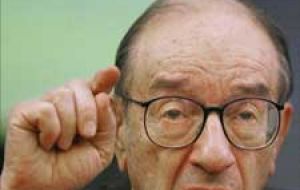MercoPress. South Atlantic News Agency
Insights to former Fed chairman Greenspan's “turbulent” years
 Alan Greenspan launch a new book “The Age of Turbulence.”
Alan Greenspan launch a new book “The Age of Turbulence.” Former United States Federal Reserve Chairman Alan Greenspan said on Friday that U.S. interest rates are low, but that rates are low all over the world.
He said the prevalence of low interest rates throughout the world was one of the things that surprised him as he prepared his reflections on his past for the new book he was promoting, "The Age of Turbulence." The book he is promoting and to be published in September, "The Age of Turbulence" will also include commentary on the future, as well as reflections on his 18-1/2 years at the helm of the U.S. Fed. He also mentioned the lessons learnt from the 1987 stock market crash and the 9/11 terrorist attacks. "Interest rates in the United States are low, but they are low all over the world, including developing nations which never saw single-digit interest rates" he said adding that he was particularly encouraged about the outlook for Europe due to recent and upcoming changes in political leadership in France, Germany and Britain. Of France's newly elected president, Nicolas Sarkozy, Greenspan said, "He struck me as very smart, very French and, I thought, pro-American." Greenspan said he had known Sarkozy from his tenure as French finance minister. "Pro-American in the sense that I think he admires the American economy and what we've accomplished," Greenspan added about Sarkozy. Commenting on his past as Fed chief, Greenspan gave unusual insights into the often opaque style of communication that became his trademark in testimony before Congress. "I got people asking questions that I couldn't and shouldn't answer because there are certain answers no matter how you phrase them and what you do have a market effect," Greenspan said. "I found that where I got a question and got myself into a position where I didn't, couldn't and was not going to answer, I fell back into lapsed syntax and all sorts of ways in which the senator or congressman would think I was saying something terribly profound and think I answered his question." He said one of the most important lessons he learned as Fed chief came in the wake of the attacks on the U.S. on September 11, 2001. Though the economy stumbled, it proved to be "far more flexible" than he had thought it was. "Because we can't forecast crises or events like the stock market crash in 1987 or 9/11, we must be prepared and capable of absorbing shocks," Greenspan said.




Top Comments
Disclaimer & comment rulesCommenting for this story is now closed.
If you have a Facebook account, become a fan and comment on our Facebook Page!